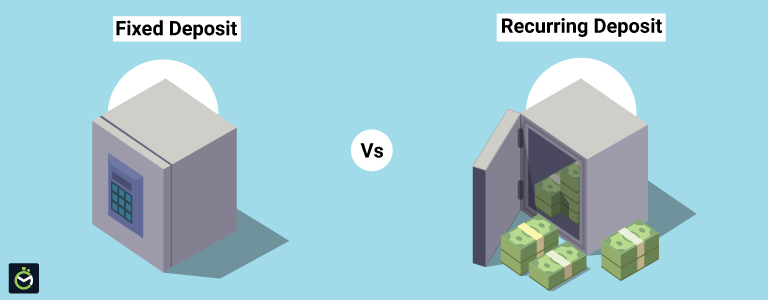A question that often comes up when discussing investments is “Which one should I go for: FD or RD?” This is a valid question. Your investments play a considerable role in how you manage your finances today and tomorrow.
Your investments should be planned in such a way that they support your financial goals. In this article, we will try to understand traditional investment tools (FDs and RDs) and how to choose between them. Keep reading to find out when to open a fixed deposit account and when to invest in a recurring deposit account.
What Are FDs And RDs?
Both fixed deposits and recurring deposits are investment tools available with banks and financial institutions at a predetermined rate of interest.
In the case of an FD account, you deposit a lump sum for a fixed tenure. The return is paid to you quarterly, annually or after the end of your FD tenure.
RDs are term deposit investment schemes where you make regular deposits in your RD account and get returns on investment at the end of the investment tenure.
Let’s see how to pick between FDs and RDs and which one is better suited to support your goals?
Before investing, you must be clear about certain things—what is the goal for which you are saving and when would you need the money? The answers to these questions will decide where you should invest.
Click here – 7 Customer Retention Strategies In The Insurance Industry
FDs And RDs Are known To Support Some Of The Most Essential Goals As Mentioned Below:
Emergency funds
It is essential to invest in an emergency fund so that you have liquidity when money is needed the most. FDs and RDs are great tools to help hold your emergency fund. If you have extra cash, you can invest in a FD account. Another way is to keep aside small amounts of money every month in a recurring deposit account. Both of them will help you build a stable emergency fund.
Small-term goals
If you have a planned expense in the future, FDs and RDs are great options to save for it. Either set aside a big chunk in a FD account or deposit small amounts in a RD account for a long time. You can use both the principal and the interest earned to support your future purchase.
Steady parallel income
The interest offered by banks on FDs and RDs can be availed as per your preference. If you have an extra source of income, you can invest the extra earnings in an FD or RD account and set the payouts on a quarterly basis.
Click here – 10 Factors That Impact Your Auto Insurance Rate
Benefits of FD and RD accounts:
- FDs and RDs are safe modes of investment and are not market-dependent.
- You can save taxes by investing in tax-saver FDs.
- FDs provide higher interest than normal savings accounts.
- You can avail a quick loan against your FD and RD accounts. The loan amount is usually 90% of the amount in your account.
- A FD account can also help you get a credit card without a credit score. Kotak811 offers a rewarding credit card without credit score option with their zero balance account. The digital savings account is also handy when it comes to taking care of day-to-day banking activities.
- People of all age groups can open a FD or RD account seamlessly.
Summery
Click here to learn more about the benefits of an FD and RD account. This will further make it easy for you to invest. Remember to set your financial goal and start investing. The earlier you begin, the better the outcome.
